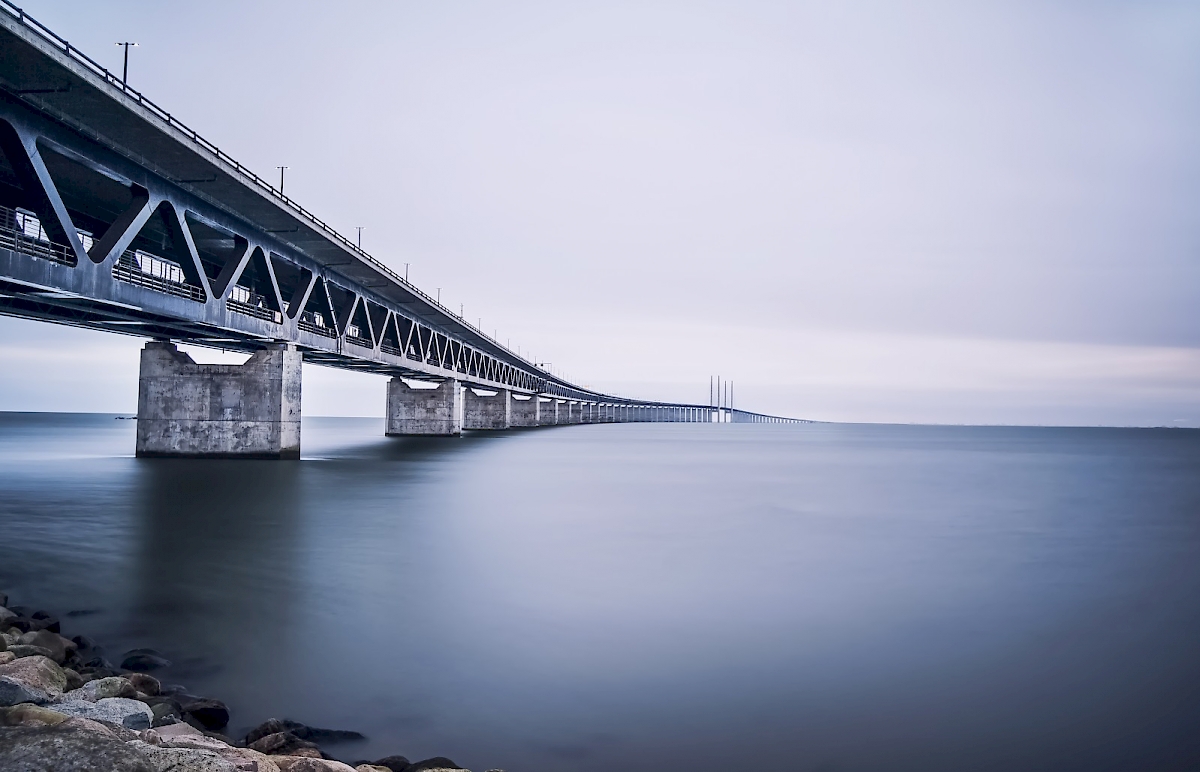The EU has seen a decline in its share of world trade and foreign direct investment. New crises loom on the horizon in the form of Brexit, an unpredictable US President, and a disintegration of the old economic order.
The new EU27 must look beyond itself and focus on relevant global challenges, which are greater than internal difficulties. To engage the European population and energise the union, large-scale initiatives are needed, and the business sector both in Europe and elsewhere has to be engaged. EU activity is currently too inward-looking and too diffuse. The EU needs to take bold steps for international economic cooperation in the pursuit of trade and investment growth, steps that will build bridges with the rest of the world, including strategic alignments with the US and Africa on one hand, and Russia and China on the other.

The European Commission’s recently published White Paper on the Future of Europe sees the EU’s main problem as one of its complexity not being well understood. What the EU is doing is not being explained at the local level: “the EU’s positive role in daily life is not visible if the story is not told locally. Communities are not always aware that their farm nearby, their transport network, and or universities are partly funded by the EU.”
The real problem, however, is that the EU is doing too many things as far as its expenditures are concerned. Clearly, the operation and improvement of the single market, as well as improvements in health, education and social protection, all require centralised regulation. However, EU funding does not need to follow every action undertaken by national, regional, and local governments across Europe.
Further, the recent White Paper is too inward-looking. It puts forward no new areas of work, apart from defence and counter-terrorism. It does not share a strong vision of the wider world. Surely the really important questions for European citizens are: where will the economic opportunities be in the world to come? And what can be done to ensure that some of those benefit Europe?
Italy's election results are the latest example of the rise of populist parties in some European countries, which is putting further strains on the European project. More positive developments are seen in the proposals from President Macron in France, in particular in relation to the governance of the Eurozone and EU activity in areas such as defence and security. These are good proposals in themselves, but they are not the right ones to counter disaffection. Action on European defence may be needed, but it is a contentious issue that will hardly capture the imagination of EU citizens. The Eurozone needs further reform, and so indeed do the European Parliament, the Commission and the Council, but a concentration on governance issues alone will repeat the all-too-frequent mistake of EU debate: a focus on how things are done, rather than on what is to be done.
Consolidating the Union
As well-meaning and diverse as EU programmes are, there is a clear lack of scale and strategic purpose. The EU currently approves and funds an enormous variety of initiatives from R&D to institutional development to international development assistance, regional development, and restructuring of declining industries. Yet there is insufficient coherence and learning. The EU has the intellectual and financial resources to develop new ways of monitoring and analysing all this activity so it can draw lessons: what works and what doesn’t, what activities are counter-productive, what problems are not being addressed with enough resources, and what new opportunities for social and economic transformation can be identified. Rigorous analysis is needed to deal with a changing world. This does not need new resources but the mobilisation of existing expertise in member states.
One clear winner, European Commission activity in the field of telecommunications has achieved some positive resonance among consumers, who have welcomed the abolition of roaming charges that came into effect in June 2017. But there is much more to be done to improve processes as far as the consumer is concerned. For many services of consumer interest, there are effectively 28 separate country markets. Regulation may be coordinated, but each member state still has its own financial, energy and telecommunications regulators, even though the enterprises being regulated are often organised on a Europe-wide basis. The areas of health services, banking, insurance, and pharmaceuticals also need to be opened up so that the single market becomes a reality for European consumers.
Despite lagging efforts on co-ordination on many fronts, except for the world’s largest nations, the majority of countries recognise that the best protection of their interests and the best path to their own strategic goals is to cooperate. That is the basis not just of the EU, but of other groupings such as ASEAN. This thinking also underlies regional trade agreements which often go beyond trade either in their provisions or in their stated ambitions.
Yet one problem with regional groups is that they are often based on geography, or language or historical links, none of which may be very important in the globalised economy. Links with key economies outside the group are not necessarily improved through cooperation. For example, in the previous article on EU Trade and Investment we saw that the biggest increase in trade density for the EU was the internal one. As regional integration increases, or indeed is threatened, policy-makers may focus too much on the region and its problems, and miss the bigger picture. So, a key objective of a regional group should be to build strategic external links.
Building Bridges
The EU must build bridges, which could be realised by supporting infrastructure development and/or facilitating large-scale trade and investment flows between regions. But who can take on such tasks, and which countries would make for strategic links?
At the moment, Brussels is swamped with lobbyists, similarly to Washington DC. Any serious large enterprise, European or not, has a representative office in Brussels to monitor proposed EU legislation and initiatives, and to press for changes in rules and regulations. Critics say the influence of enterprises on the Commission is too great. No one says the opposite is true. It is time for the EU itself to take the lead, encouraging the formation of consortia of firms to make an impact on some of the external policy priorities for Europe.
Up to now, this has been limited to encouraging firms to compete for science, technology and innovation funding, or organising economic dialogues and trade and investment fairs and meetings. There is also institutional support with the funding of the Centre for Industrial Development, part of a process of cooperation with Africa, Caribbean and Pacific States. Something bigger and more ambitious is needed. EU funding or at least financial intervention in the form of loan guarantees or long-term bond issues will be catalytic.
The external action service is a valuable resource for the EU, but it could be better used in conjunction with the member states representations in third countries in order to increase understanding of the EU, in terms of its achievements, its capabilities, and, most importantly, its intentions. This would emphasise the role of countries as members, would mobilise additional resources and would also increase solidarity between the member states.
US-Europe-Africa
Traditionally, both the UK and other EU members have had strong links with Africa, mainly, but not exclusively, as a result of their colonial past. EU27 exports to Africa are 3.7% of its total merchandise exports, while African exports to the EU27 are 30.5%. By contrast, the figures for the US are small: US exports to developing Africa are 1.8% of total US merchandise exports, and the share of the US in Africa’s exports is 6.1%. Both the US and the EU have made special trade provisions for Africa, in addition to preferences under WTO and ACP agreements.
The US is anxious to increase its influence in Africa in particular to counter the growth of terrorism. The EU has similar interests in that instability in Africa will result in major increases in attempted migration to Europe. A positive approach in which the EU consciously tried to link together the US and Africa would benefit the three participants, and would bring a new dimension to existing trade and investment relationships.
Africa has enormous potential in terms of agriculture, especially in the southern hemisphere, together with huge mineral wealth, and major energy and tourism potential. The current incremental approach to development, with small projects here and there led by hundreds of agencies and NGOs is failing against the tide of corruption, conflict, and natural disasters. As climate change intensifies, a bold new initiative is needed - and the EU is well placed to lead it. There are also now potential regional counterparts: in the last few years organisations such as the African Union, as well as bodies such as ECOWAS and the East African Community, have strengthened in operation and in determination.
Additionally, EU agricultural policy is undergoing change. Payments to large producers are being capped. Yet these large producers have the technical expertise to produce, store, and distribute food in a highly productive way. Their engagement in joint ventures in Africa could transform income and employment possibilities on the continent, and this engagement could be encouraged by European Commission via financial incentives. This would not only contribute to improved food security for Africa and the EU, it would also mitigate the risk of large scale uncontrolled migration in the future as global warming changes the pattern of agricultural production.
China-Russia-Europe
Russia is essentially the missing link between Europe and China. Its vast natural resources represent a potential focus of activity that could give a new boost to the region and encourage better infrastructure and more trade and investment. Russia has a falling population and is too dependent on oil and gas revenues, now in decline. In contrast, the future growth of alternative energy, now accelerating in response to climate change, seems like it will be led by China.
China has made significant investments to increase its international connectivity, especially through the development of ports and railway linkages across Asia. The 'New Silk Route' joins China with the Central Asian States and Turkey to reach European markets. Yet most of this plan involves avoiding Russian territory.
Indeed, Russia has not been engaged in this process: its cooperation initiatives have been limited to the laying of pipelines for oil and gas. Many of the political tensions between Russia and its neighbours would be lessened if economic prosperity became the focus of the Russian state policy. To achieve this, the EU can take the initiative in proposing further infrastructure development that links Europe, Russia, and China.
There are wider changes at work. Global warming is leading to the opening of new sea routes in the Arctic. One is across the north of Canada (the North-West passage) and the other is across the north of Russia (the North-East Passage). Russia has made it clear that it will control the latter. But the future could be different if there was EU-Russia-China cooperation, not just in this area but in upgrading infrastructure to achieve a new economic area, a Eurasian Single Market. Yes, China is building rail links, but the infrastructure requirements to realise the economic potential of the merged continents are enormous. Why should it be always China, rather than Europe, that has the bigger imagination and makes the bolder moves?
The EU will continue to encounter global and national economic and social problems, external threats, and internal frictions. These will all be exacerbated by deterioration in the global environment, which could well accelerate. Finding its way through these crises can best be done with strong and targeted responses. The major problems of the EU are in fact external in origin: that is why its main policy thrust and spending should now be targeted outside Europe.









